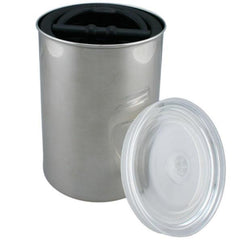This article was posted back in 2018, but since it was popular, we made videos out of it. Watch the video and enjoy the original article below!
- Rule #1: Looking for the Dates and Packaging
- Rule #2: Oxygen Robs Matcha Tea of Life-Preserving Catechins and Vitamins
- Rule #3: Storing in the Fridge Prevents Heat Damage, but it may Make your Tea Taste Funny.
- Rule #4: Don't Prepare Cold Matcha Straight Out of the Fridge.
- Rule #5: Store Matcha in the Dark: Light will Eat Away its Abundant Chlorophyll
- Rule #6: If I Leave Matcha in the Cabinet for 10 Years, Will It Taste Better?
- Additional tips on how to prolong green tea freshness
- Using Silica Gel Packets on Matcha
- What to do if you don’t want to throw those tea leaves
- How Restaurants and Cafés store their Green Tea and Matcha
- Why not make Matcha drinks in batches and store these in their commercial fridge?
- Airscape: A Safe, Convenient Way to Store Green Tea (Loose Leaf)
- Vacuum Sealed Airtight Container: This One Is For Matcha or Fine Powder
- What's the Bottom Line? The Best Way to Store Green Tea Is...
- Green Tea Infographic
6 Essential Rules for How to Store Green Tea and Matcha
Matcha, an ancient Japanese green tea, has become widespread due to its countless health benefits, antioxidant properties, and similar-to-coffee caffeine-content. However, you run to the store and stock up on this vibrant green powder, you must know how to care for it.
Matcha is delicate, like a newborn baby. You simply cannot leave an open jar of matcha powder on your kitchen counter; when exposed to elements such as heat and air, Matcha will lose its flavor, freshness, and antioxidants within days.
Read on to learn how to store Matcha properly to ensure you get the most out of this ancient elixir.

Rule #1: Looking for the Dates and Packaging
Japanese green tea products have a before date of one year indicated on the packaging, while Matcha has six up to eight months. Although Matcha has a long shelf life, consuming it up to 60 days from the day the package was opened is recommended.
There are some Matcha and loose-leaf tea products with two years best before or expiration dates, but in reality, the dates are only there to boost sales, and the quality will diminish during that extended period. Although if stored in the pantry, fridge, or freezer unopened, it may last fresh for up to one year and still safe to consume for up to 2 years.
Check if the packaging is secured, punctured, or opened.
If the packaging is secured, it is good. Otherwise, look for another one.
Rule #2: Oxygen Robs Matcha Tea of Life-Preserving Catechins and Vitamins
Catechins are a type of antioxidant found in matcha tea. In fact, this is probably one of the reasons you began drinking Matcha in the first place—you heard of its abundant health benefits. However, you must take proper care of your tea to ensure it retains its benefits.
Matcha tea’s number-one threat is oxygen. Oxidation deteriorates the tea’s nutrients, such as catechins and vitamins. Therefore, your Matcha must be stored in an airtight container.
Many airtight containers on the market, many created specifically for tea storage. Make sure not to store your tea in a simple Ziploc bag or plastic kitchen container, because your Matcha will still be exposed to the air inside the container, and thus, it will oxidize.
It would be best to have a container that squeezes the air out, leaving the tea in a vacuum. One strategy is to put Matcha into a Ziploc bag, squeeze all the air out, and store that bag inside a matcha-specific airtight container such as the Yuzen Washi Japanese Tea Canister. Keep reading for more top-notch, oxygen-proof storage options.
Yuzen Washi Japanese Tea Canister for Matcha Powder and Loose Leaf Tea

Rule #3: Storing in the Fridge Prevents Heat Damage, but it may Make your Tea Taste Funny.
You may also know that heat and humidity can turn Matcha tea stale. If you live in a hot and humid place, you may be tempted to throw your jar of Matcha in the fridge. Before you do so, however, we suggest you consider these additional points.
If your tea package is not open yet, just put that inside the fridge. Since it is still sealed and inside the fridge, no light or high-temperature heat will pass through those tea leaves or Matcha.
If you live in a cold place, you can put your matcha container in your cupboard or pantry at room temperature to avoid condensation.
If your bag of tea is already open (especially matcha tea), it will quickly absorb strong odors, including that leftover plate of chicken wings sitting in your fridge covered in tinfoil. Without proper precautions, your precious Matcha could end up tasting like leftover chicken wings.
To prevent this fate, we again recommend storing Matcha under multiple layers of airtight protection. A suitable method is to use the Ziploc bag inside an airtight container, as described above.
It will be best to store Matcha in separate containers (2 or more) so you can only remove the Matcha you only need out of the fridge.
If you drink tea rarely, placing these in the fridge is not ideal. Just place your tea in a zip lock bag inside an airtight container and keep it in the freezer.
Also, remember to use a clean, dry spoon when scooping Matcha so the moisture will not make it through the matcha powder in the container. Same with scooping tea leaves.
Fridge vs Room Temperature:
Aside from layers of protection on your tea, the fridge helps slow down the oxidation and maintain the quality of your tea.
When storing tea at room temperature, you can prepare it quickly, especially when you frequently drink it. Also, the texture, color, aroma, and taste are better than refrigerated tea. Also, a long time ago until now, it has been a traditional practice to store tea in a container that keeps tea away from heat and light.

Rule #4: Don't Prepare Cold Matcha Straight Out of the Fridge.
Furthermore, storing tea in the fridge may, in fact, create the humidity-damaging effects that you intended to prevent.
When you remove the tea from the fridge, the tea is cold. It then comes into contact with warmer air in your house, producing condensation and therefore introducing the tea to freshness-damaging moisture.
A solution is to take out the tea storage container, keep the lid closed, and let it warm up for several hours. After the tea has been allowed to warm up for at least half a day, you may open the container and prepare delicious Matcha. You may be tempted to place the container outside under the sun, but doing this will oxidize the Matcha faster, resulting in shorter shelf life and bitter or metallic taste because of the sun's UV rays and instant heat instead of gradually making the tea turn into room temperature. In short, storing Matcha in the fridge is fine if you care for your tea properly.
Rule #5: Store Matcha in the Dark: Light will Eat Away its Abundant Chlorophyll
Chlorophyll is a chemical that gives plants their green color. Because Matcha is a special variety of shade-grown green tea, it takes much longer for the plant to mature, and thus, the tea leaves produce higher levels of chlorophyll. This makes Matcha distinct from other green teas and gives it its electric green color.
The drawback is that while light helps matcha plants produce chlorophyll, it also destroys chlorophyll once the Matcha is processed. Therefore, tea experts suggest storing Matcha in a dark place or a dark (not clear) container. Exposing Matcha to light, they say, may give the tea a metallic taste.
For this reason, we suggest not storing Matcha in a transparent or translucent container or, if you must, place the clear container in a dark closet that you don't open frequently. Or, store Matcha in an opaque, airtight container such as the ones mentioned in this article, which you can keep in the fridge or on the kitchen counter.

Rule #6: If I Leave Matcha in the Cabinet for 10 Years, Will It Taste Better?
Some people may tell you that "aged matcha" is even more flavorful than fresh Matcha, and you may even see aged Matcha on store shelves. You may be tempted to try aging your own Matcha to see what happens. However, we advise against it.
Tea experts can create aged Matcha in heat, light, and humidity-controlled environments. As we've explained, Matcha is a fragile beverage, and aging such a finicky tea takes extreme oversight and care.
However, leaving matcha in your cabinet for several years will ruin its freshness and may even make you sick. Even with the best care, matcha has a shelf life of about one year, and most recommend consuming it within 60 days of opening. If the color of Matcha is dull and smells nothing or repulsive, it is not safe to drink it. For Japanese Green tea, check the texture and the smell. The smaller the leaves, the shorter its shelf life.
Additional tips on how to prolong green tea freshness
- Buy green tea/matcha in a small pack instead of a large one unless you drink these daily.
- While it is advisable to store opened tea in separate containers, it is good to put these in the freezer if you make Matcha on rare occasions.
- Not every tea is suitable to store frozen. It might work well for some oolongs, white teas, and green teas but not as well for strong, highly oxidized teas like black tea or post-fermented teas.
- Freezing tea could be a good choice for some tea varieties and storage conditions. Nonetheless, it's imperative to utilize airtight containers, permit slow temperature changes, and pay attention to the kind of tea being kept.
- Some matcha is sold in resealable pouches or vacuum-sealed bags. After opening, roll the top of the bag to expel excess air, then zip/vacuum and secure the bag in a folded position.

Using Silica Gel Packets on Matcha
Silica gel is usually odorless, tasteless, and not too dangerous. Still, it says on the packet, "DO NOT EAT" because it is a choking hazard and might cause nausea and vomiting when accidentally eaten.
Silica helps to extend life on food and other things. It can absorb moisture and prevent clumping on Matcha powder. Some tea manufacturers put these inside the Matcha container.
If you want to use silica gel, look for a food-grade one to ensure food safety. The number of silica gel packets depends on how big the Matcha powder is, but usually, one packet is enough. You can wrap the packet with a coffee filter or cheesecloth to prevent silica granules from coming out. Remember to write the date on the Matcha container when you added the silica gel packets, and replace them regularly to ensure optimal freshness.
What to do if you don’t want to throw those tea leaves
As long as the leaves don’t smell rancid, you can turn these leaves into Hojicha (black tea) by roasting and tossing them on a small clay pot over a fire pit. You may use a cast iron pan over a stove. A frying pan will do, but you have to be careful as the leaves might be easily burnt instead of having a dark color with nutty or roasted aroma.
If the leaves are that bad, do not roast them; just throw them away.
For expired Matcha, you can incorporate it in your cooking if the only problem is the dull color, but the flavor is still there. You can also mix it on DIY face masks and scrubs, as Matcha is known for detoxifying and revitalizing skin.
If Matcha goes terrible, unfortunately, you have to throw it, unless you will use it as dye in arts and crafts.

How Restaurants and Cafés store their Green Tea and Matcha
They also do the same ways at home, but they do not store Japanese green tea close to other herbs and other kinds of tea, as their aroma and flavor might get mixed. The worst thing to happen when mixed with other food groups is contamination.
Like how stores group their items, they organize the teas of same type.
Although it is not ideal to store opened Matcha with layers of ziplock bags and container in the fridge, some restaurants keep their Matcha in the freezer if they are overstocked, but not in the fridge because of the fridge’s humidity like mentioned earlier about tea having a funny taste in the fridge.
They rotate their stocks by practicing First In, First Out (FIFO) to serve their customers the freshest drink they have.
Why not make Matcha drinks in batches and store these in their commercial fridge?
Matcha might taste sour or stale. On Matcha lattes, when mixing Matcha with milk and sweetener, the Matcha will sink to the bottom. Even worse, the Matcha will taste sour and watery.
Adjust the quantities depending on how many drinks you plan to make and your personal preferences.
Brew Matcha in batches by sifting it into a big bowl. After that, add some warm water. Pour it over a frother or whisk it with an electric whisk. Put the sweetener in. Once you find the Matcha still thin to your liking, pour water again.
When brewing Matcha, a cocktail mixer is also a great substitute.
Matcha can then be stored for up to five or seven days by pouring it into a bottle container and refrigerating it.

Airscape: A Safe, Convenient Way to Store Green Tea (Loose Leaf)
AirScape containers are popular among coffee drinkers… and should be popular with green tea drinkers. Why? Because coffee and tea share the same threats to their freshness: oxygen, heat, light, moisture, and strong odors.
Due to the AirScape container's one-way air valve, it ensures that whatever you put in it has a completely air-free home. If you have a lot of green tea to store, or even just a little, it'll be safe and free from oxidation in one of these containers.
Additionally, the container is opaque, which prevents light damage. This feature will also prevent strong kitchen odors from damaging your tea's vibrant taste. While a bit pricier than a basic green tea jar, this container will ensure your delicious green tea loses none of its flavors. See the price and product description here.
Note: This product works well for loose leaf tea, but the fine powder could get stuck in the suction mechanism. For recommendations for matcha storage, read on to the next section.

Vacuum Sealed Airtight Container: This One Is For Matcha or Fine Powder
As I mentioned above, AirScape is great for loose leaves, but the powder could get stuck in the system. I found a workaround to put kitchen paper between the Matcha and lid to avoid this since AirScape is the best container that gives an airtight environment inside.
If you do not want to use kitchen paper for Matcha, we recommend Vacuum Sealed Air-Tight Container. This allows air to escape by pressing the top lid, preserving the Matcha well.
Click here to see the product detail.
What's the Bottom Line? The Best Way to Store Green Tea Is...
Use an AirScape container, or at least an airtight, opaque matcha container. If you live in a hot place, store the Matcha container in the fridge; however, be sure to let it come to room temperature before opening the container. Lastly, prepare matcha within two months of opening and keep unopened containers for one year.

Green Tea Infographic
These infographics are from our Green Tea Infographic Board on Pinterest. Follow us on Pinterest to see more infographics like this!
• Disclosure: I only recommend products I would use myself, and all opinions expressed here are my
own. This post may contain affiliate links that I may earn a small commission at no additional cost to you.
The commission also supports us in producing better content when you buy through our site links.
Thanks for your support.
- Kei and Team at Dream of Japan
Get Free Bonus Books

Sign up for free to the Green Tea Club to get advice and exclusive articles about how to choose Japanese Tea, and tips, tricks, and recipes for enjoying Japanese tea.
About the author
Kei Nishida
Author, CEO Dream of Japan
Certification: PMP, BS in Computer Science
Education: Western Washington University
Kei Nishida is a Japanese green tea enthusiast, a writer, and the founder and CEO of Japanese Green Tea Co., a Dream of Japan Company. His passion for introducing America to the tea of his homeland was the catalyst for creating the only company that brings high-quality tea from Arahataen Green Tea Farms to the rest of the world. Learn more about Kei




























